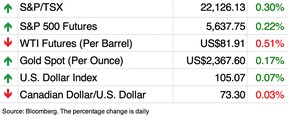Active listings in Toronto surge almost 70% to 14-year high

Article content

Sellers are streaming back into the housing market, inflating inventories in Canada’s biggest cities and handing more bargaining power to potential buyers.
The Bank of Canada‘s slight cut to interest rates last month enticed some buyers off the sidelines, but not enough to absorb the new inventory that’s been building for months, said Royal Bank of Canada economist Rachel Battaglia in a report out yesterday.
Advertisement 2
Article content
“Growth in new listings continued to outpace sales in Canada’s more expensive markets, and inventories are continuing to grow — even in the busy Calgary market,” she said.
“The influx of supply has shifted more of the bargaining power to buyers, who in some markets are still extracting price concessions from sellers.”
Many sellers are likely timing their move ahead of interest rate cuts, expecting a rebound in demand, says her report. There may also be more homeowners and investors who are compelled to sell because of financial strains.
Buyers, however, have yet to return en masse and a recent poll by the Toronto Regional Real Estate Board suggested it would take a cumulative interest rate cut of 100 basis points or more to significantly spur home sales.
No where is the rush to sell more apparent than in the country’s biggest city.

Almost 18,000 new units went up for sale in Toronto in June, an 9.3 per cent rise from the month before and the third monthly increase in a row.
Active listings are now up 68 per cent from a year ago, with condo listings up 84 per cent. Listings for single-detached homes are up 56 per cent.
Article content
Advertisement 3
Article content
“A slight uptick in sales activity (4.2 per cent) from May helped absorb some of the new inventory on the market, but not enough to keep active listings from reaching a 14-year high of 23,600 in June,” said Battaglia.
Toronto home sales are still down 13 per cent from a year ago, and prices are down 4.6 per cent. Apartments have suffered the steepest declines, with prices down 4.7 per cent, particularly in Toronto’s core and Durham region, said RBC.
“We think it’ll take steeper interest rate cuts before prices and activity in Toronto heat up again,” Battaglia said.
Vancouver saw an uptick in sales in June, but an even bigger increase in new listings, which RBC estimates jumped 9.5 per cent from May.
That boost brought monthly prices down for the first time since November, putting the composite MLS benchmark home price index just 0.5 per cent above a year ago.
“We expect inventories to build further in the months ahead as budget constrained buyers wait for more rate cuts before entering the market,” said the report.
Home sales in Montreal rose 4 per cent in June from May, but that hardly put a dent in the existing inventory, said RBC, which estimates active listings are now 24 per cent higher than last year.
Advertisement 4
Article content
“We think inventories are likely to continue trending higher in Montreal. That should keep a lid on price appreciations in the months ahead,” said Battaglia.
Sign up here to get Posthaste delivered straight to your inbox.

The United States trade deficit widened in May to the largest since 2022 as a drop in exports exceeded the drop in imports.
Jennifer Lee, a senior economist at BMO Capital markets, said the gap may reflect some goods from China passing through Mexico with minimal changes. The trade deficit with Mexico hit a record $159 billion in May.
“Think of it as a pitstop en route to their ultimate destination: America,” she said.
Expect measures to address this backdoor when the USMCA, or North American trade agreement, comes up for review in January 2026, said Lee.
- Federal Reserve chair Jerome Powell testifies before Congress
- Aritzia Inc. to host 2024 annual general meeting
- Today’s Data: United States NFIB small business optimism

Advertisement 5
Article content
Recommended from Editorial
The 10 biggest stocks in the S&P 500 now account for more than one third of the index, and that’s a problem for investors and portfolio managers alike. Investing pro Martin Pelletier explains how investors can avoid the dangers of FOMO on overdrive. Find out more.
Are you worried about having enough for retirement? Do you need to adjust your portfolio? Are you wondering how to make ends meet? Drop us a line with your contact info and the gist of your problem and we’ll try to find some experts to help you out, while writing a Family Finance story about it (we’ll keep your name out of it, of course). If you have a simpler question, the crack team at FP Answers, led by Julie Cazzin, can give it a shot.
McLister on mortgages
Want to learn more about mortgages? Mortgage strategist Robert McLister’s Financial Post column can help navigate the complex sector, from the latest trends to financing opportunities you won’t want to miss. Plus check his mortgage rate page for Canada’s lowest national mortgage rates, updated daily.
Today’s Posthaste was written by Pamela Heaven, with additional reporting from Financial Post staff, The Canadian Press and Bloomberg.
Have a story idea, pitch, embargoed report, or a suggestion for this newsletter? Email us at posthaste@postmedia.com.
Bookmark our website and support our journalism: Don’t miss the business news you need to know — add financialpost.com to your bookmarks and sign up for our newsletters here.
Article content










